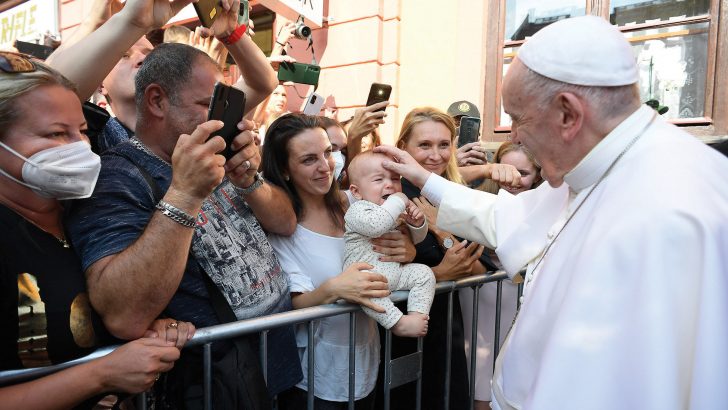Junno Arocho Esteves
On paper, Pope Francis’ apostolic visit to Hungary and Slovakia was pretty standard as papal trips go: outdoor Masses, meeting with dignitaries, visiting poor and marginalised populations and of course, answering questions from journalists aboard the papal flight.
Nevertheless, issues such as vaccine scepticism, migration, same-sex “marriage,” and denying Communion to Catholics who publicly support abortion attracted worldwide attention to what was believed to be a low-key trip.
The Catholic Church has not been spared the effects of the increased polarisation on the issues plaguing the world, a reality Pope Francis showed he was keenly aware of in his first two speeches in Budapest.
During his meeting with Hungary’s Ecumenical Council of Churches, the Pope used the country’s famed Széchenyi Chain Bridge, which links the eastern and western sides of Budapest along the Danube River, as a metaphor for how the Church should manoeuvre in an increasingly divided world.
Together
“The bridge does not fuse those two parts together, but rather holds them together. That is how it should be with us, too,” the Pope told the ecumenical gathering September 12.
“A bridge unites. In this sense, it reminds us of the concept, so fundamental in Scripture, of covenant. The God of the covenant asks us not to yield to separatism or partisan interests. He does not want us to ally ourselves with some at the expense of others. Rather, he wants individuals and communities to be bridges of fellowship with all,” he added.
Metaphor
He doubled down on the metaphor when speaking to the country’s bishops, urging the Church in Hungary to “be a builder of bridges and an advocate of dialogue.”
The word “pontifex” means pontiff, but it also means “bridge-builder” and, throughout his visit, Pope Francis tried to put his words into practice in the hopes of showing that differences of opinions on hot-button issues do not preclude dialogue and engagement.
Among the many issues that put his skills to the test was his meeting with the Hungarian leadership, including Viktor Orbán, the country’s outspoken prime minister who stands at odds with the Pope’s views on immigration.
However, while media reports leading up to the meeting envisioned a contentious tête-à-tête on immigration, the Pope deflated those expectations and said the discussions revolved around common ground issues.
Specifically, the Pope praised Hungary’s environmental policies as well as government subsidies to encourage families to have more children.
Speaking to journalists aboard the papal flight back to Rome September 15, the Pope also said he spoke mainly with Hungarian President János Áder, while Mr Orbán and Deputy Prime Minister Zsolt Semjén occasionally “added some specifics.”
“On migration, nothing, no. We didn’t talk about it,” he said. “It was a good climate. And it lasted quite a bit, I think 35-40 minutes.”
In a September 13 interview with Hungary’s Kossuth Radio, Mr Semjén said the Pope “was delighted that the number of abortions dropped, while the number of marriages increased in Hungary.”
He also said the Pope was told that Hungary was “under attack from Brussels,” the administrative centre of the European Union, because of the country’s family policies, which some believe are discriminatory against migrants and same-sex couples.
“His Holiness said that ‘family is a father, a mother, a child, period,’” Mr Semjén said.
Divisive
While divisive issues continue to shake both the unity of the world and of the universal Church, Pope Francis’ visits to Hungary and Slovakia aimed to show that a bridge is only as good as the chain that holds it together.
“The bridge has yet another lesson to teach us,” the Pope told members of the ecumenical council. “It is supported by great chains made up of many rings. We are those rings, and each of us is essential to the chain.”
“We can no longer live apart, without making an effort to know one another, prey to suspicion and conflict,” he said.


 Pope Francis greets a baby during a meeting with
the Roma community in the Luník IX neighbourhood
in Košice, Slovakia, September 14. Photo: CNS
Pope Francis greets a baby during a meeting with
the Roma community in the Luník IX neighbourhood
in Košice, Slovakia, September 14. Photo: CNS 